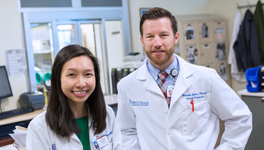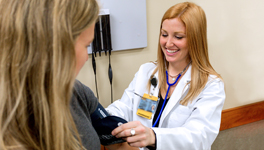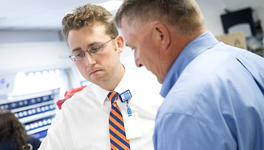
2/4/2019
David Hager
David’s Story
David Hager, Pharm.D., BCPS is the Director of Clinical Pharmacy Services at the University of Wisconsin Health (UW Health). He also serves as Director of UW Health’s PGY1 Pharmacy Residency Training Program. He received his Doctor of Pharmacy degree from the School of Pharmacy at the University of Wisconsin-Madison in 2005. He completed a PGY1 pharmacy residency at the University of Wisconsin Hospital and Clinics in 2006. He is a Board Certified Pharmacotherapy Specialist.
His current areas of oversight include: layered learning activities including experiential education, internship, longitudinal APPE students; pharmacist advancement and credentialing programs; pharmacist certification; the transplant service line; relations with the School of Pharmacy at the University of Wisconsin-Madison; transitions of care; and inpatient pharmacy practice.
Currently, I’m a member of the Section Advisory Group on Patient Care Quality and a delegate within the ASHP House of Delegates (On Wisconsin!). This past MCM I had a presentation – “Healing Our Healers: When Mental Health Interferes with Performance”. I’m proud to have presented with a past resident on how we take better care of our caregivers and deal with mental illness when it arises within our colleagues.
Facility
UW Health is the integrated health system of the University of Wisconsin-Madison serving more than 600,000 patients each year in the Upper Midwest and beyond with over 1,400 physicians and 16,500 staff at six hospitals and 80 outpatient sites. UW Health partners with UW School of Medicine and Public Health to fulfill their patient care, education, research, and community service mission. The University of Wisconsin Hospital is a 505-bed tertiary care teaching hospital, level one trauma center and home of the Carbone Cancer Center and one of the country’s largest solid organ transplant programs. UW Health also has extensive ambulatory care services and clinics with more than 2,797,000 outpatient visits annually.
Significant Projects
To highlight a few of our recent projects at UW Health. We have been working on co-locating decentral inpatient pharmacists with physicians and APPs within provider workrooms. Co-location allows pharmacists to prospectively assist in medication therapy planning with greater insight into the interprofessional teams thinking, increases face-to-face communication and improves pharmacist/provider satisfaction. We are continuing to work service line by service line to identify physical space and capacity to include pharmacists in provider rooms. Additionally, we have been working on implementation of pharmacist pending of discharge medications, which appeared in the October 1st issue of AJHP. We continue to see benefits in accuracy, efficiency and provider satisfaction and are now starting to roll it into surgical enhanced recovery after surgery protocols to optimize opioid prescribing.
Advice for Someone New to Your Specialty Area
"For someone new to transplant I would recommend getting involved early in research within your organization. The relationships you will develop with physicians and other members of the team will help you the rest of your career. The work will hone your skills in literature evaluation, statistics, writing and project management. The process of developing your research question will get you deeper into the literature. When you present your work, it will broaden your professional network and set you up for future projects and collaboration. This probably applies to nearly any specialty and it was the best thing I did to jump start my career. Within administration or leadership, I would focus on what your strengths are. Figure out what comes easy to you that is harder for others. Try to spend more time doing those activities or projects and measure the results you get. Manage that success up and more of that type of work will come your way and a positive cycle starts. Do not worry about what your weaknesses are (we all have them) and try to spend more of your time maximizing your strengths."
Involvement in ASHP
"I have considered ASHP my professional home since prior to residency. When I found clinical pharmacy as a P1 student during one of my IPPE experiences at UW Health it changed my career. I saw on pediatrics the impact we can have on patient care and the level of respect our interprofessional colleagues had for pharmacists. What I found out later, was that this was not the level of practice everywhere in the country and there were some patients who were not getting this same care due to a variety of factors (organizations not allocating sufficient resources to pharmacy departments, fragmented practice models, scope of practice limitations, etc.). I knew I wanted to collaborate with others to help remove barriers and share best practices to improve the level of practice everywhere. I found that ASHP was the organization that most aligned with that goal. Also, I am invested in ensuring high quality experiences for our learners at all levels. As a Residency Program Director, I find the resources available to me to improve my program through ASHP and have found a network of other pharmacists across the country who share my drive to offer great experiences to residents."
ASHP’s Value to Members
"ASHP membership is an easy way to support our profession and some great people. In all my interactions with ASHP staff you quickly get the sense for how much they care about moving our profession forward, creating new areas of collaboration strategic to health-systems and how much they care about ASHP and want it to be successful. We need a strong national society with these types of great individuals to meet the challenges within healthcare we are all facing and will continue to face. Getting involved and volunteering your time to move ASHP forward will give back more to you than you’ll ever invest – in friends, in good times and in great ideas you can bring back to your organization to improve patient care."
"A strong ASHP is vital to our goals for the profession. As health-system pharmacists, we have had a long journey to becoming indispensable to our organizations and for others to clearly understand the value a strong pharmacy department can have to a healthcare organization. ASHP has led through recent work like the Practice Advancement Initiative, Ambulatory Care Summit, and Technician Summit to form the key collaboratives and national discussions that determine the future shape of practice. With the amount of change to come and with rising pressure on the healthcare system a strong ASHP is essential to advancing the roles of our profession and showing others how pharmacy is part of the solution."

Section of Pharmacy Practice Leaders
A community fostering management skills and effective leadership
SPPL on Connect
Member-only section discussions, blogs and announcements on ASHP Connect


